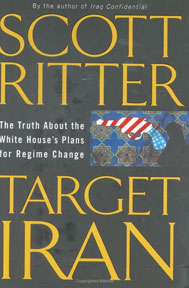
Challenges and challengers
Iran’s Assembly of Experts elections
December 16, 2006
iranian.com
TEL AVIV -- On December 15th 2006, more than fifteen million Iranians went to the polls, to elect the members of the Assembly of Experts. The main job of this assembly is to review the performance of Iran’s supreme leader, and to replace him, if he dies or becomes incapacitated. In the Western world, the task of this assembly can best be compared to that of the Vatican’s College of Cardinals, who is in charge of choosing the pope. Its 86 members are all clergymen, who stand for elections every eight years.
In terms of importance, the assembly elections eclipse Iran’s Presidential elections of 2005. Iran’s resident Ahmadinejad, despite all his fiery talk and bravado, only holds 10% of power, given to him by the constitution. The supreme leader however, is the most powerful person in all of Iran. He is the person with the last say over Iran’s internal and external policies, and its nuclear program.
The upcoming elections are proving to be another battleground in the power struggle between the Traditionalists, Conservatives, Reformists and the Pragmatist political camps in Iran. The goal of each front is to win as many seats as possible, so that the next supreme leader is from them.
The Traditionalist front consists of Ayatollahs, who wish to keep power in the hand of clergy. This group is against the rise of non clerical leaders, such as Mahmoud Ahmadinejad, who are gaining more political power at their expense. Headed by the Iraqi born Ayatollah Shahroudi, who is also the Head of the Judiciary, the chances of success for this group are strong. This is because the Guardian Council, which has the final say over candidate qualification, is made up of many Traditionalist Ayatollahs itself. As a result, the majority of candidates for this group have been accepted; more than any other front standing for the assembly elections.
Meanwhile the conservatives are headed by Ahmadinejad’s ally, Ayatollah Mesbah Yazdi. Nicknamed Professor Crocodile by the Iranian public, (Mesbah rimes with the word Temsah, meaning crocodile in Persian); he is one of Iran’s most rightwing messianic Ayatollahs. Some of Mesbah Yazdi’s beliefs are so radical, that he makes conservative Ayatollahs such Khamenei sound like closet reformists. “Introducing democracy is like injecting the AIDS virus into a healthy body” is just one of his fanatic ideologies. His main goal is to increase the power of non clerical revolutionaries such as Mahmoud Ahmadinejad and his Revolutionary Guard comrades, who share his messianic views. The chances of success for this group are medium to small, because the Guardian Council, who sides with the traditionalists, disqualified at least half of its candidates.
The reformists have the smallest chance for victory at the upcoming elections, because both the Traditionalist and the Conservatives are against them. The conservatives, who control the Ministry of Interior, disqualified a large number of reformist candidates. The majority of those who survived were then disqualified by the traditionalist controlled Guardians Council. The reformists never had much power in the Assembly of Experts. It seems that after these elections, they are going to have even less.
 The pragmatists however, are in a different position. They are headed by Ayatollah Rafsanjani, one of the shrewdest political operators in Iran. His nickname “Koose” meaning Shark in Persian was given to him by the Iranian public, because of his hairless face and his cunning ability to launch sudden ambushes against his enemies. Rafsanjani, lost in the Presidential elections of 2005, due to what he believes was cheatings against him by the conservatives. This infuriated him. Since then, he has been looking to take revenge. The pragmatists however, are in a different position. They are headed by Ayatollah Rafsanjani, one of the shrewdest political operators in Iran. His nickname “Koose” meaning Shark in Persian was given to him by the Iranian public, because of his hairless face and his cunning ability to launch sudden ambushes against his enemies. Rafsanjani, lost in the Presidential elections of 2005, due to what he believes was cheatings against him by the conservatives. This infuriated him. Since then, he has been looking to take revenge.
In September 2006, he did just that. Living up to his nickname, out of nowhere, “The Shark” launched a sudden ambush against his conservative enemies, by publishing a classified letter written by Khomeini in 1989, in which he based his decision to stop the war against Iraq on recommendations from the conservatives.
Until then, the conservatives, who viewed the ceasefire as a bad decision, had publicly blamed Rafsanjani. His revelation was a sever embarrassment for the conservatives. It was also a warning, that if they try to rig the elections again, Rafsanjani is willing and able to launch more attacks. This attack has increased Rafsanjani’s chances for success, as it dissuaded the conservatives from disqualifying his candidates at the Ministry of Interior. Furthermore, Rafsanjani’s common goal to sideline the conservatives has won him more allies at the Traditionalist controlled Guardian Council.
When it comes to election time in Iran, there is a hardly a dull moment. The upcoming Assembly of Experts elections, with its numerous fronts and challengers, promises to be one of the more entertaining political competitions in Iran. Comment
About
Meir Javedanfar is an Iranian-born Middle East Analyst and the Director or the Middle East Economic and Political Analysis Company, meepas.com. He has been quoted and interviewed by the BBC, Radio Holland International, Haaretz Newspaper and the Boston Globe as well as a number of other newspapers and Radio stations. For rights to quote this article please contact analysis@meepas.com.
|